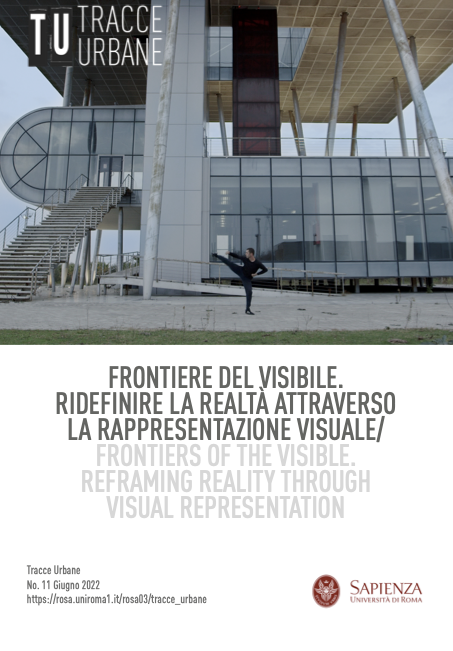What role does filmmaking have in the Planetary Emergency? Beyond the Screen, stories of Deforestation, Cross-Cultural Collaborations & Penan Resistance in Sarawak, Malaysia
DOI:
https://doi.org/10.13133/2532-6562/17923Parole chiave:
emergenza planetaria, attivismo, cinemaAbstract
Siamo in un’emergenza planetaria e, mentre affrontiamo la minaccia alla sopravvivenza, questo contributo vuole interrogarsi sul ruolo che svolgono il cinema e le collaborazioni interculturali nel pensare un futuro sostenibile. In quella che è stata definita “la più grande tragedia ambientale del nostro tempo” (Brown 2011), l’articolo approfondisce gli ultimi quarant’anni di deforestazione e gli atti di resistenza nel Sarawak, in Malesia. Negli ultimi dieci anni ho collaborato come artista/attivista/amico con le comunità Mutang Tu’o e Penan e questo articolo cerca di articolare le domande e le proposte emerse dalla mia esperienza e ricerca. Come regista, condivido le vulnerabilità della mia stessa pratica. Come membro del pubblico, rifletto sull’ampia documentazione della campagna del Sarawak. Come spirito, racconto la storia di ciò che ho imparato sulla terra vivendo con i nomadi. Metto in dubbio l’impatto della sensibilizzazione, il ruolo degli eroi e sento i limiti del concentrarsi sul paesaggio mediatico mentre l’ambiente viene distrutto davanti ai nostri occhi. Un invito all’azione.
Riferimenti bibliografici
Albrecht G., Sartore G.M., Connor L., Higginbotham N., Freeman S., Kelly B., Stain H., Tonna A., Polland G. (2007). «Solastalgia: the distress caused by environmental change». Australia Psychiatry. 95-8: 14 Suppl 1.
Augé M. (1995). Non-places. introduction to an anthropology of supermodernity. Howe, John (trans.) London: Verso Press.
Boellstorff T. (2008). Coming of Age in Second Life. An Anthropologist explores the Virtually Human. Princeton: Princeton University Press.
Brosius J. P. (1986). «River, forest and mountain: The Penan Gang landscape». Sarawak Museum Journal, Vol. 36 (57):173- 184.
Brosius J. P. (1990). «Penan Hunter-Gathers of Sarawak, East Malaysia». AnthroQuest (42): 1-7.
Brosius J. P. (1991). «Foraging in Tropical Rainforests: The Case of the Penan of Sarawak, East Malaysia (Borneo)». Human Ecology, Vol. 19 (2): 123-50.
Brosius J. P. (1992). «Perspectives on Penan Development in Sarawak». Sarawak Gazette. Vol. 119: 5-22.
Brosius J. P. (1993). «Penan of Sarawak». In Miller M. S. (ed). State of the Peoples: A Global Human Rights Report on Societies in Danger. Boston: Beacon Press (for Cultural Survival Inc.)
Brosius J. P. (1995). «Borneo Forest Trade in Historical and Regional Perspective: The Case of the Penan Hunter-Gathers of Sarawak». In: J. Fox (ed.), Society and Non-Timber Products in Tropical Asia. East-West Centre Occasional Papers: Environmental Series no. 19. Honolulu: East-West Centre.
Brosius J. P. (1997a). «Endangered Forest, Endangered People: Environmentalist Representations of Indigenous Knowledge». Human Ecology. Vol. 25: 47-69.
Brosius J. P. (1997b). «Prior Transcripts, Divergent Paths: Resistance and Acquiescence to Logging in Sarawak, East Malaysia». Comparative Studies in Society and History (39): 468-510.
Brosius J. P. (1999). «Green Dots, Pink Hearts: Displacing Politics from the Malaysian Rain Forest». American Anthropologist. Vol.101: 36-57.
Brown G. (2011) «Fight for the Borneo rainforest: Gordon Brown celebrates the role of journalist Clare Rewcastle». The Independent. (http://www.independent.co.uk/environment/ green-living/fight-for-the-borneo-rainforest-gordon-brown- celebrates-the-role-of-journalist-clare-rewcastle-2237427.
html. Accessed 18/8/2017.
Davis W. and Thom H., eds., (1990). Penan: Voice of the Borneo Rainforest. Vancouver: Western Canada Wilderness Committee.
Davis W., Mackenzie I., Kennedy S. (1995). Nomads of the Dawn: The Penan of the Borneo Rain Forest. San Francisco: Pomegranate Artbooks.
Foster J. B. and Burkett P. (2017). Marx and the Earth: An Anti- Critique. Chicago: Haymarket Books.
Global Witness (2021). Press Release: https://www. globalwitness.org/en/press-releases/global-witness-reports- 227-land-and-environmental-activists-murdered-single-year- worst-figure-record/.
Harari Y. N. (2017). Homo Deus: A brief History of Tomorrow. New York: Harper Collins.
Harrison R., dir., (2014) Sunset Over Selungo. Independent Prod.
Hilber, Niklaus, dir., (2019) Paradise War: The Story of Bruno Manser. A Film Company: Switzerland.
Kühn, Christoph, dir., (2007) Bruno Manser – Laki Penan. Filmingo: Switzerland.
Marcus G. E. (1998). Ethnography through thick and thin. Princeton, N.J.: Princeton University Press.
Mirzoeff N. (2014). «Visualising the Anthropocene». Public Culture 26,2: 213-232. Duke University Press.
Ortner S. B. (2016). «Dark anthropology and its others: Theory since the eighties». HAU: Journal of Ethnographic Theory 6 (1): 47-73.
Pauser E. and Williams D., dir., (2016). The Borneo Case. Sweden & England: Amp Films & Britdoc Foundation.
Scott J. C. (1998). Seeing Like a State: How Certain Schemes to Improve the Human Condition Have Failed. New Haven, CT: Yale University Press.
Straumann L. (2014). Money Logging: on the trail of the Asian timber mafia. Bergi Books Switzerland.
Laozi [600BC] (1996). Tao Te Ching. Ware: Wordsworth Editions.
Todd Z. (2016). «An Indigenous Feminist’s take on the Ontological Turn: ‘ontology’ is just another word for colonialism (Urbane Adventurer: Amiskwacî)». Journal of Historical Sociology. Vol 29, 1.
Tsing A., Swanson H., Gan E. and Bubandt, N., eds., (2017). Arts of Living on a Damaged Planet: Ghosts and Monsters of the Anthropocene. University of Minnesota Press, Minneapolis.
Tu’o, M. and Blake K., dir., (2020). TULIN. Life in a Broken System Prod. Available Online: https://youtube.com/ playlist?list=PLEudo_MHfGmTpsi-k-iIoSH_0nyFq68vN
Wallerstein I. (1991). Report on an Intellectual Project: The Fernand Braudel Center, 1970-1991. Binghamton, NY: Fernand Braudel Cent.
##submission.downloads##
Pubblicato
Come citare
Fascicolo
Sezione
Licenza
Copyright (c) 2022 Blake Kendall

TQuesto lavoro è fornito con la licenza Creative Commons Attribuzione 4.0 Internazionale.
NOTA DI COPYRIGHT
Proposta di licenza Creative Commons
1. Proposta per riviste Open Access
Gli autori che pubblicano su questa rivista accettano le seguenti condizioni:
Gli autori mantengono i diritti sulla loro opera e cedono alla rivista il diritto di prima pubblicazione dell'opera, contemporaneamente licenziata sotto una Licenza Creative Commons - Attribuzione che permette ad altri di condividere l'opera indicando la paternità intellettuale e la prima pubblicazione su questa rivista.
Gli autori possono aderire ad altri accordi di licenza non esclusiva per la distribuzione della versione dell'opera pubblicata (es. depositarla in un archivio istituzionale o pubblicarla in una monografia), a patto di indicare che la prima pubblicazione è avvenuta su questa rivista.
Gli autori possono diffondere la loro opera online (es. in repository istituzionali o nel loro sito web) prima e durante il processo di submission, poiché può portare a scambi produttivi e aumentare le citazioni dell'opera pubblicata (Vedi The Effect of Open Access).


